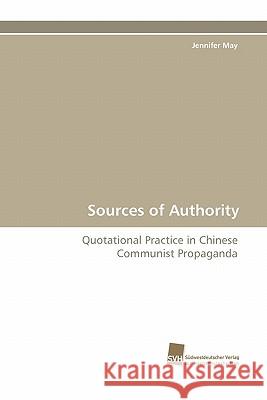Sources of Authority » książka
Sources of Authority
ISBN-13: 9783838125343 / Angielski / Miękka / 2011 / 344 str.
The conflicting relation and interplay between a canon fixed in wording and interpretation on the one hand, and the volatility and ambiguity of the "quotable quote" (Garber: Quotation Marks, 2003) on the other hand is the main objective of this work. Without quotation the canon cannot and will not survive. But how does quotation affect the authority of the canon? I argue that quotation 'classics' are not made, they are quoted: It is the quoter and not the author of a text who wields the (democratic) power of choosing the quotable. I investigate how the canon prescribed by the Chinese Communist Party becomes the classic chosen by individual quoters writing for the "People's Daily," the mouthpiece of this Party. The time frame under investigation reaches from the founding of the People's Republic of China in 1949 to the present. In five case studies I illuminate the reciprocal influence between quotation and canon, between innovation and imitation in modern China.
The conflicting relation and interplay between a canon fixed in wording and interpretation on the one hand, and the volatility and ambiguity of the "quotable quote" (Garber: Quotation Marks, 2003) on the other hand is the main objective of this work. Without quotation the canon cannot and will not survive. But how does quotation affect the authority of the canon? I argue that quotation classics are not made, they are quoted: It is the quoter and not the author of a text who wields the (democratic) power of choosing the quotable. I investigate how the canon prescribed by the Chinese Communist Party becomes the classic chosen by individual quoters writing for the "Peoples Daily", the mouthpiece of this Party. The time frame under investigation reaches from the founding of the Peoples Republic of China in 1949 to the present. In five case studies I illuminate the reciprocal influence between quotation and canon, between innovation and imitation in modern China.











